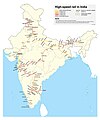Nagpur–Varanasi high-speed rail corridor
Appearance
This article needs additional citations for verification. (August 2021) |
| Nagpur–Varanasi High Speed Rail Corridor | |||||||||||||||||||||||||||||||||||||||||||||||||||||||||||||||||||||||||||||||||||||||||||||||||||||
|---|---|---|---|---|---|---|---|---|---|---|---|---|---|---|---|---|---|---|---|---|---|---|---|---|---|---|---|---|---|---|---|---|---|---|---|---|---|---|---|---|---|---|---|---|---|---|---|---|---|---|---|---|---|---|---|---|---|---|---|---|---|---|---|---|---|---|---|---|---|---|---|---|---|---|---|---|---|---|---|---|---|---|---|---|---|---|---|---|---|---|---|---|---|---|---|---|---|---|---|---|---|
| Overview | |||||||||||||||||||||||||||||||||||||||||||||||||||||||||||||||||||||||||||||||||||||||||||||||||||||
| Status | Planned | ||||||||||||||||||||||||||||||||||||||||||||||||||||||||||||||||||||||||||||||||||||||||||||||||||||
| Owner | Indian Railways | ||||||||||||||||||||||||||||||||||||||||||||||||||||||||||||||||||||||||||||||||||||||||||||||||||||
| Locale | |||||||||||||||||||||||||||||||||||||||||||||||||||||||||||||||||||||||||||||||||||||||||||||||||||||
| Termini | |||||||||||||||||||||||||||||||||||||||||||||||||||||||||||||||||||||||||||||||||||||||||||||||||||||
| Stations | 10 (expected) | ||||||||||||||||||||||||||||||||||||||||||||||||||||||||||||||||||||||||||||||||||||||||||||||||||||
| Website | www | ||||||||||||||||||||||||||||||||||||||||||||||||||||||||||||||||||||||||||||||||||||||||||||||||||||
| Service | |||||||||||||||||||||||||||||||||||||||||||||||||||||||||||||||||||||||||||||||||||||||||||||||||||||
| Type | High-speed rail | ||||||||||||||||||||||||||||||||||||||||||||||||||||||||||||||||||||||||||||||||||||||||||||||||||||
| Operator(s) | National High Speed Rail Corporation Limited | ||||||||||||||||||||||||||||||||||||||||||||||||||||||||||||||||||||||||||||||||||||||||||||||||||||
| Rolling stock | E5 Series Shinkansen | ||||||||||||||||||||||||||||||||||||||||||||||||||||||||||||||||||||||||||||||||||||||||||||||||||||
| History | |||||||||||||||||||||||||||||||||||||||||||||||||||||||||||||||||||||||||||||||||||||||||||||||||||||
| Planned opening | 2041 [1] | ||||||||||||||||||||||||||||||||||||||||||||||||||||||||||||||||||||||||||||||||||||||||||||||||||||
| Technical | |||||||||||||||||||||||||||||||||||||||||||||||||||||||||||||||||||||||||||||||||||||||||||||||||||||
| Line length | 760[2] km (470 mi) | ||||||||||||||||||||||||||||||||||||||||||||||||||||||||||||||||||||||||||||||||||||||||||||||||||||
| Character | Elevated, underground and grade-separated | ||||||||||||||||||||||||||||||||||||||||||||||||||||||||||||||||||||||||||||||||||||||||||||||||||||
| Track gauge | 1,435 mm (4 ft 8+1⁄2 in) standard gauge | ||||||||||||||||||||||||||||||||||||||||||||||||||||||||||||||||||||||||||||||||||||||||||||||||||||
| Electrification | 25 kV AC, 50 Hz, overhead catenary | ||||||||||||||||||||||||||||||||||||||||||||||||||||||||||||||||||||||||||||||||||||||||||||||||||||
| Operating speed | 320 km/h (200 mph) | ||||||||||||||||||||||||||||||||||||||||||||||||||||||||||||||||||||||||||||||||||||||||||||||||||||
| |||||||||||||||||||||||||||||||||||||||||||||||||||||||||||||||||||||||||||||||||||||||||||||||||||||
The Nagpur–Varanasi High Speed Rail Corridor is one of the six new proposed high-speed rail lines that will connect Maharashtra's eastern city Nagpur to Uttar Pradesh's Varanasi.[1]
This line will link with the Delhi–Kolkata line, hence connecting Mumbai with the eastern India.[3]
Possible stations
[edit]The stations are on the planned alignment as shown on National Rail Plan's (NRP) High-speed rail line map.
Project status
[edit]2021
[edit]- December: Ministry of Railways had planned to propose four new high-speed rail corridors in India, including a 855 km corriodor from Nagpur to Varanasi.[4][5]
See also
[edit]References
[edit]- ^ a b "Railway Budget 2021: Indian Railways to focus on new bullet train networks in coming years?". The Times of India. 23 January 2021.
- ^ "Indian Railways conducts feasibility studies for high-speed rail on THESE three Golden Quadrilateral routes – Details here". Financialexpress. 10 February 2024. Retrieved 21 June 2024.
- ^ "Bullet train to Jammu, Guwahati? Indian Railways proposes to connect these major cities with high-speed rail". The Times of India. 19 December 2020.
- ^ "Railways likely to propose creation of four new bullet train corridors taking total to 12". New Indian Express. 31 December 2021.
- ^ "Slow progress for India's high-speed rail revolution". CNN. 2 March 2022.
External links
[edit]Categories:
- High-speed railway lines in India
- Standard gauge railways in India
- Rail transport in Maharashtra
- Rail transport in Chhattisgarh
- Rail transport in Madhya Pradesh
- Rail transport in Uttar Pradesh
- Proposed railway lines in India
- India–Japan relations
- 2020 in rail transport
- Transport in Nagpur
- Transport in Varanasi
- Proposed infrastructure in Madhya Pradesh
- Proposed infrastructure in Maharashtra
- Proposed infrastructure in Uttar Pradesh

